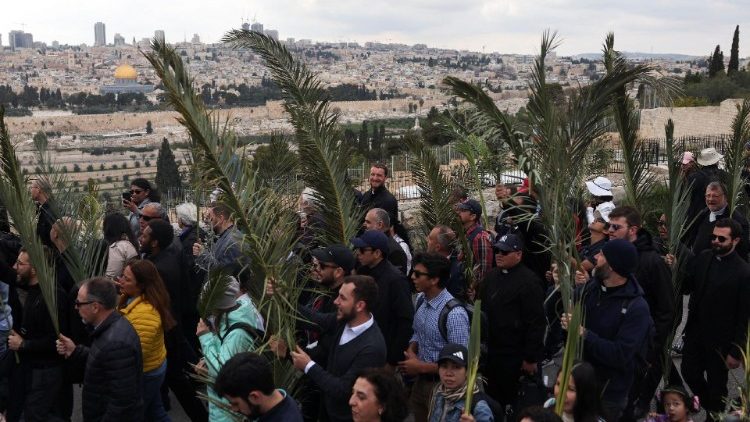Profound meaning of Holy Week
Far from the traditional festive atmosphere, the death and resurrection of Christ will be celebrated by Christians in Jerusalem in meditation, prompting deeper reflection on the meaning of those events in the light of the present situation, which seems to leave hardly any space for hope.
Indeed, the violence suffered by Jesus in the Gospel can help Christians in the Holy Land today to look beyond despair, said Bishop Rafic Nahra, the Auxiliary Bishop of the Latin Patriarchate of Jerusalem, in an interview with Vatican News’ Jean Charles Putzolu.
“I believe that this Holy Week gives us back the true perspective of the Christian faith, on the situation, which is somehow desperate,” the Patriarchal Vicar for Israel said, expressing his hope that the subdued atmosphere of these Easter celebrations may help reflect on this deep meaning of Holy Week, urging a collective journey in the footsteps of Christ.
There is light amid darkness
The Auxiliary Bishop of Jerusalem went on to remark that amidst the darkness of war overshadowing the Holy Land and beyond, we must never lose sight of the light of the Resurrection of Christ, but also of the light that is already here: that of the “wonderful people” who have shown compassion and solidarity since the beginning of war between Israel and Hamas nearly six months ago, transcending the prevalent climate of violence and hatred.
He cited the examples of Palestinian and Jewish doctors and nurses who have been assisting injured people on both sides.
“We must not be impressed by the currently prevalent hate speech,” he said. “The light is present. It is through people who have this light in their hearts.”
Sowing seeds of peace overcoming hatred
Reflecting on Jesus’ experience of being welcomed triumphantly in Jerusalem only to then face crucifixion and be abandoned by the people who had hailed him, Bishop Nahra, spoke about the challenges faced by those advocating a peaceful solution to the conflict. Despite being marginalized and discredited, he emphasized the importance of persevering in sowing seeds of peace.
Need for conversion of hearts to forgiveness
For peace to take root, Bishop Nahra said there is a need for conversion of the hearts, shifting away from revenge, prevalent in both Israeli and Palestinian societies, towards forgiveness and understanding.
“We need to look at others as human beings, whatever has happened, and this can be done only through God’s grace.”
Recalling that forgiveness is at the heart of the Gospel, Bishop Nahra concluded by urging Christians not to forget this message in the face of suffering and darkness.
By Jean Charles Putzolu and Lisa Zengarini






